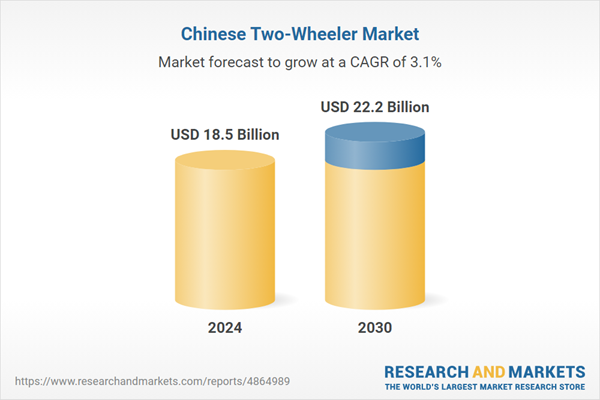Speak directly to the analyst to clarify any post sales queries you may have.
10% Free customizationThis report comes with 10% free customization, enabling you to add data that meets your specific business needs.
With a large urban working population, motorcycles and scooters are a preferred mode of transport for both personal and commercial use. New consumer expectations around performance, safety, and tech-enabled features are shaping how manufacturers approach design and innovation. Stringent emission regulations and carbon neutrality goals are driving investment in clean technologies and electric variants.
Growth is further supported by government subsidies and local policies promoting electric vehicle adoption. The presence of a mature component manufacturing ecosystem and widespread availability of service networks are encouraging faster product turnaround and lower ownership costs. Consumers are shifting toward connected and lightweight models that offer both efficiency and digital integration. Improvements in vehicle range, battery lifecycle, and smart features are enhancing the value proposition of electric two-wheelers.
Despite positive growth signals, the market faces challenges related to unorganized local players, poor quality standards in low-end segments, and rising competition from alternative mobility solutions. Regulatory uncertainty in some regions and issues with charging infrastructure continue to create roadblocks. Nevertheless, the long-term outlook remains strong as companies invest in R&D, international expansion, and digital transformation to capture new customer segments.
Market Drivers
Urban Congestion and Last-Mile Mobility
The increasing population density in major Chinese cities has intensified traffic congestion, making compact, agile transportation essential. Two-wheelers offer a practical solution for navigating narrow streets and avoiding traffic bottlenecks, particularly for short commutes and last-mile deliveries. As city infrastructure becomes more crowded and demand for faster intra-city mobility rises, two-wheelers are increasingly preferred by individuals and delivery-based businesses.With ride-hailing and logistics platforms expanding their fleets with two-wheelers, demand continues to surge. Public policies promoting multimodal integration also position two-wheelers as a vital link in urban transportation networks. This urban evolution fosters a market environment where two-wheelers are seen as a necessity rather than a convenience. The consistent growth of urban centers combined with the need for efficient commuting solutions continues to fuel this demand, making last-mile mobility one of the key forces pushing the two-wheeler market forward in the upcoming forecast period.
Key Market Challenges
Traffic Safety Concerns
Rapid expansion in two-wheeler usage has resulted in increased traffic incidents, raising concerns over road safety. Many urban centers report a high proportion of traffic accidents involving motorcycles or scooters, especially due to speeding, non-compliance with traffic rules, or lack of proper licensing. Inexperienced riders, underage usage, and informal driving schools compound the issue. While regulatory efforts have tightened licensing norms, enforcement often lags in smaller towns and rural zones.The lack of dedicated lanes for two-wheelers and poor road conditions also heighten risk. Negative public perception stemming from safety concerns can hinder adoption among cautious consumers. Insurance costs may also rise, deterring budget-focused users. These safety issues pose a reputational challenge for the industry and demand long-term investment in rider education, vehicle safety features, and improved road infrastructure. If unaddressed, this challenge could stall the market’s potential growth and limit its acceptance as a reliable transportation mode.
Key Market Trends
Rising Preference for Electric and Smart Two-Wheelers
Consumers in China are increasingly opting for electric two-wheelers integrated with smart features such as GPS tracking, Bluetooth connectivity, remote diagnostics, and mobile app integration. According to the Ministry of Public Security (MPS), As of late 2024, China had over 145 million registered two-wheelers, of which nearly 72 million were electric (e-bikes and e-motorcycles).These vehicles appeal to tech-savvy urban commuters who seek convenience, efficiency, and control. The adoption of smart battery management systems improves range accuracy and charging performance, making e-two-wheelers more practical for daily use. As urban congestion worsens, the demand for intelligent mobility solutions rises. Younger consumers are also drawn to connected riding experiences, especially in the context of shared mobility and subscription services. Domestic manufacturers are investing in innovation, integrating AI and IoT capabilities into product lines to stay competitive. Fleet operators and logistics firms are also adopting smart EVs to monitor and manage delivery operations more effectively. This convergence of electrification and digitization is reshaping consumer expectations and pushing the market toward intelligent, sustainable, and user-centric mobility solutions.
Key Market Players
- AIMA Technology Co., Ltd.
- Chongqing Yinxiang Motorcycle (Group) Co., Ltd.
- Dongguan Tailing Electric Vehicle Co., Ltd.
- Jiangmen Dachangjiang Group Co., Ltd.
- Lifan Holdings Co., Ltd.
- Loncin Holding Ltd.
- Sundiro Honda Motorcycle Co., Ltd.
- Yadea Group Holdings Ltd.
- Zhejiang Luyuan Electric Vehicle Co., Ltd.
- Zongshen Industrial Group Co., Ltd.
Report Scope:
In this report, the China Two-Wheeler Market has been segmented into the following categories, in addition to the industry trends which have also been detailed below:China Two-Wheeler Market, By Vehicle Type:
- Motorcycle
- Scooter/Moped
China Two-Wheeler Market, By Propulsion:
- Internal Combustion Engine
- Electric Vehicles
China Two-Wheeler Market, By End Use:
- Personal
- Commercial
China Two-Wheeler Market, By Region:
- South-Central
- South-West
- East
- North & Northeast
- North-West
Competitive Landscape
Company Profiles: Detailed analysis of the major companies present in the China Two-Wheeler Market.Available Customizations:
With the given market data, the publisher offers customizations according to the company’s specific needs. The following customization options are available for the report.Company Information
- Detailed analysis and profiling of additional market players (up to five).
This product will be delivered within 1-3 business days.
Table of Contents
Companies Mentioned
- AIMA Technology Co., Ltd.
- Chongqing Yinxiang Motorcycle (Group) Co., Ltd.
- Dongguan Tailing Electric Vehicle Co., Ltd.
- Jiangmen Dachangjiang Group Co., Ltd.
- Lifan Holdings Co., Ltd.
- Loncin Holding Ltd.
- Sundiro Honda Motorcycle Co., Ltd.
- Yadea Group Holdings Ltd.
- Zhejiang Luyuan Electric Vehicle Co., Ltd.
- Zongshen Industrial Group Co., Ltd.
Table Information
| Report Attribute | Details |
|---|---|
| No. of Pages | 70 |
| Published | August 2025 |
| Forecast Period | 2024 - 2030 |
| Estimated Market Value ( USD | $ 18.5 Billion |
| Forecasted Market Value ( USD | $ 22.2 Billion |
| Compound Annual Growth Rate | 3.1% |
| Regions Covered | China |
| No. of Companies Mentioned | 10 |









